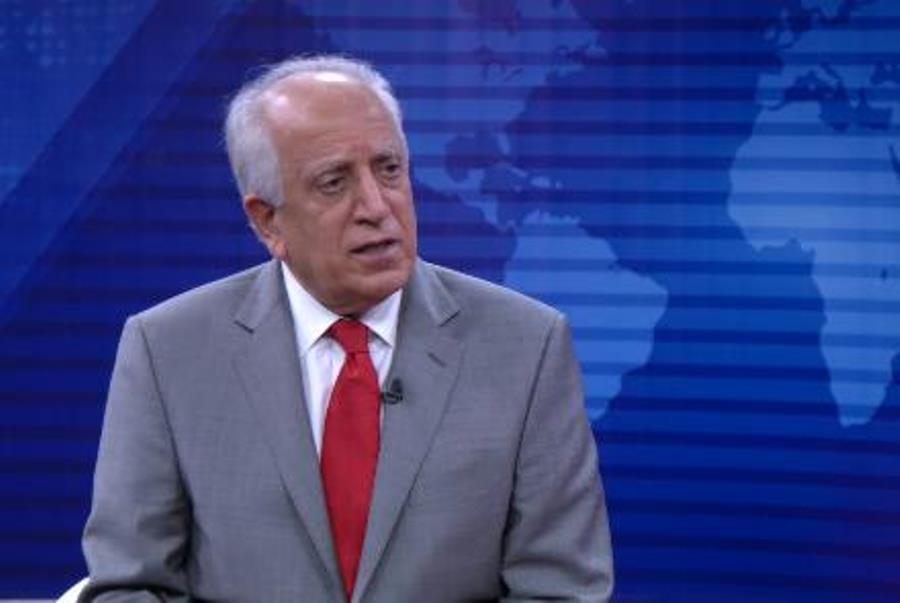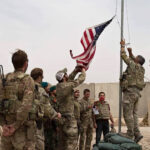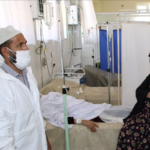US special envoy Zalmay Khalilzad, currently on a regional tour amid the withdrawal of American and coalition forces from Afghanistan, says two options remain for Afghanistan at this critical juncture: A political solution to the conflict or continued war. He reiterated that the United States will not abandon Afghanistan despite US troops leaving.
In his first interview with TOLOnews after the start of the troop withdrawal, Khalilzad said on Monday that attempting a military solution will result in a continued war, while also acknowledging that the peace process in Doha has been slow and that both sides of the negotiations have not focused on the main issues.
Khalilzad is accompanied by an interagency US delegation, and upon its arrival the group held separate meetings with President Ashraf Ghani and HCNR Chairman Abdullah Abdullah, focusing on the new chapter in Kabul-Washington ties as well as discussing region’s role in the peace process.
The Taliban recently floated a request for the release of 7,000 more prisoners by the Afghan government as well as the removal of their leaders’ names from the blacklist, as catalysts to renew the peace efforts. But Khalilzad said these two conditions are not practical given the current circumstances in which violence remains high in the country.
Khalilzad said that the Taliban has not responded to a US plan for Afghanistan’s future after it was shared with them, and they have not returned a plan in response to the United States.
“Some Taliban negotiators, including their chief negotiator Shaikh Hakim, went to Quetta and had some discussions, and have returned now and say they are interested in the resumption of the talks in the near future, and that they might submit their plan to the Republic delegation,” Khalilzad said.
The Ministry of Defense reports clashes between Afghan forces and Taliban in more than 10 provinces on a daily basis, and analysts say there is no clear information about the progress of the peace talks.
Indirectly acknowledging the high level of violence, Khalilzad warned that the continuation of fighting after the withdrawal of US forces from Afghanistan will open the way for regional interferences in the country.
“There are two ways in a long-term perspective: Either there should be a political agreement or there would be a continued war. And God forbid, if an endless war happens, interferences in Afghanistan’s affairs by the region might increase, and this is not in Afghanistan’s favor,” Khalilzad said.
Recently, some districts have been either “evacuated” or security forces have made “tactical retreats,” including two districts on Sunday–one in Uruzgan and the other in Ghor– increasing the challenges faced by Afghan forces to maintain morale.
Concerning the fate of the Afghan army after all foreign troops pullout, Khalilzad in Monday’s interview said “some among the Taliban” are “proud of” Afghanistan’s army, a statement which contrasts a remark by Taliban’s former chief negotiator Abbas Stanekzai who in 2019 spoke about “dissolving” Afghan army once the group takes power. Stanekzai’s remarks were at the height of the group’s talks with US negotiators that led to the signing of the Doha agreement.
Khalilzad said there was now an army that “did not exist some years back when the US came in, a national army that we are also proud of … believe me, even some Taliban are proud of it and said ‘don’t let this army be dismantled.”
However, the Taliban’s former chief negotiator said the following around that time:
“This is not our national army. An army would defend Afghanistan’s borders, defend against the enemy. This army is under the control of the enemy itself… When the Americans leave, their payments will end and they will be ended too,” Abbas Stanekzai said in February 2019.
In response to a question on the legacy of the US war in Afghanistan, which cited the scrapped equipment by American forces outside Bagram Airfield and the deadly attack on a school in the west of Kabul as indicators that would challenge a US narrative of success, Khalilzad said these does not tell the whole story of the US’s legacy in the country.
“This is a tiny and limited part of the history or the legacy – as you mentioned – of the US presence in Afghanistan. I want to say that the US troops are leaving but the US is not leaving Afghanistan. A strong relationship will continue, but I see other things, too, as the legacy of the US presence in Afghanistan. I see TOLO (TV) as a legacy of freedom of speech,” Khalilzad said. “It was made after the US presence, a new system was established, a new environment was created. I see a large number of girls going to schools, I see universities full of students, I see the extension of life expectancy among Afghans, I see the youth who show their skills, the institutions that have been built, the improvement that has been achieved.”
Khalilzad said that the United States will stand with Afghan security forces until peace is established in the country, and cited the $3.3 billion that the Biden administration put in the proposed Pentagon budget for Afghanistan in 2022.
Khalilzad said he is accompanied by a team from various agencies that will meet with the Afghan government about the transfer of responsibility as American troops withdraw, as well as issues following withdrawal including peace and economic and security cooperation.













